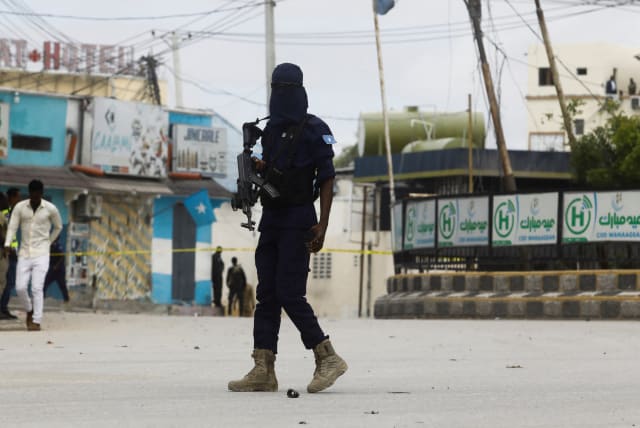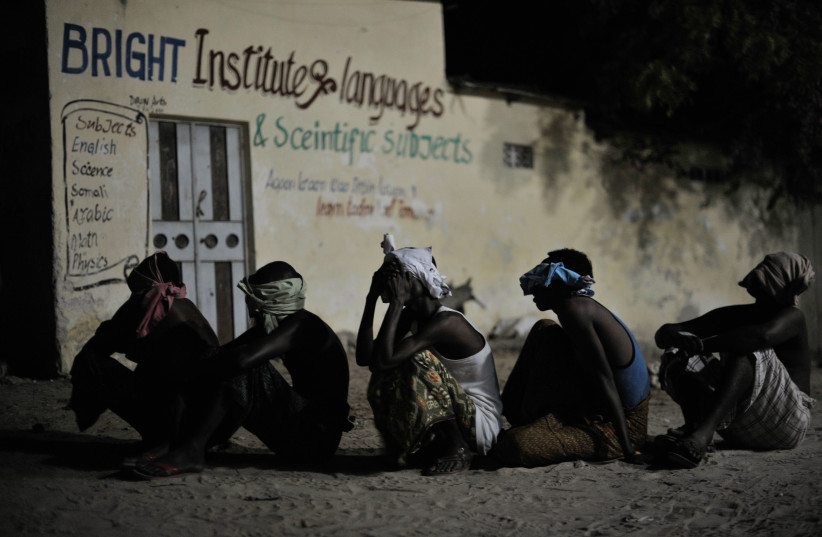Somali lawmaker to TML: Gov't making gains in battling al-Shabab

Secretary of the Somali Defense Committee Ahmed Abdi Koshin says military offensive has 'successfully dislodged' the al-Qaeda-linked terror organization from many parts of the country.
The capital of Somalia, Mogadishu, was once again the scene of a gunfight between the country's security forces and the al-Qaeda-linked terror organization, al-Shabab. Somalia's government announced on Tuesday that a group of al-Shabab fighters stormed a house owned by a senior military officer who was sheltering members of a pro-government militia, who had been injured in previous clashes with al-Shabab.
Ten people in the home were killed, as well as the four al-Shabab fighters, according to the Somali Ministry of Information.
Somalia's government, together with allied local militias and with the support of international powers, launched in August 2022 a strong offensive against al-Shabab – which is holding several villages hostage throughout the country, in a bid to completely eradicate the terror organization.
Secretary of the Somali Defense Committee, and Federal Member of the Somali Parliament, Ahmed Abdi Koshin, who is also a former director general of the country’s Ministry of Defense and Internal Security, told The Media Line that the government's offensive has seen results.
"The Somali government successfully dislodged al-Shabab from many parts of the country – in particular their strongholds in Hiran region, Middle Shabelle and Galmudug – and, as we speak, that offensive is continuing with considerable gains on the ground," he said.
Somali security analyst Badri Haji explains that the government's offensive against al-Shabab is not only military, but also financial and ideological.
How has the Somali government fought back against al-Shabab?
He told The Media Line how militarily, in addition to recapturing the territories mentioned above, the Somali government in recent months has managed to reduce the size of al-Shabab's forces.
"More than 3,000 terrorists were killed, and the number of al-Shabab defectors significantly increased," he said, pointing out that some of the top al-Shabab leaders were killed, among them, Abdullahi Nadir, who had a $3 million bounty on his head in the United States.
"Abdullahi Nadir was one of the most important members of al-Shabab as he had been in a position to succeed the current al-Shabab leader, Ahmed Diriye aka Abu Ubaidah," Haji added.
Regarding the financial sphere, Haji explains that, so far, the government has frozen 250 bank accounts linked to the terror group, holding millions of dollars, and more than 70 phone numbers used to receive money payments. In addition, "the government publicly declared that anyone who paid money to al-Shabab will face punishment and will be considered a terrorist financier," he said, noting that this has brought a severe shortage in funds upon al-Shabab.
The ideological war also has been embraced by Somalia's government, which held a religious conference in Mogadishu with more than 300 influential Somali clerics from different ideological backgrounds who declared their support for the government's war against al-Shabab, Haji explained.
"This was a nightmare for al-Shabab as they rely on twisting Islamic teachings to drive their ideology. The clerics can effectively counter that narrative by drawing the line between truth and falsehood," Haji said, adding that at the end of the conference the clerics issued a fatwa, a Muslim religious ruling, against al-Shabab which said that "anyone who kills or is killed by al-Shabab is a martyr."
Koshin explains that the Somali government has formed alliances to fight the group, as well as joined forces with local tribal militias that also seek to liberate the country from al-Shabab.
"For a long time, local militias have suffered at the hands of al-Shabaab, and it has become inevitable [for them] to defend their locality," he said.
While the overall responsibility for security falls within the domain of the government, there are put in place active coordination mechanisms between the government and local militias to be part of the offensive and cooperate to eradicate al-Shabab, Koshin explained.
For over a decade, he said, al-Shabab has been controlling some parts of the country, where it has established its rule over the local population, taxing and hurting and killing locals who refuse to adhere to the group’s draconian laws.
"(W)ithout a doubt that led to the current upraising to take the fight against al-Shabab with the assistance of the Somali Security Forces," he continued.
Haji says that the government treats the local militias, known as Ma'awisley, as part of the Somali security forces, adding that the injured soldiers of these militias are airlifted to Mogadishu for treatment.
In addition to encouraging clan militias to join their fight, the government also provides them with all the needed logistical support, including ammunition, food and health care services. However, the government does not provide weapons for these militias, he points out.
He says that the local militias took up arms to resist the demands from al-Shabab because locals were and are being forced to donate money, livestock, weapons and even their children to al-Shabab.
Powerful members of the international community also are taking a significant part in the offensive.
Terrorism, according to Koshin, "is a common denominator regionally and throughout the world, and international security partners have a vested interest in assisting Somalia to eradicate al-Shabab. Hence, there are a number of countries supporting Somalia, including the US, UK, Turkey, and ATMIS (African Union Transition Mission in Somalia)," he said.
The United States is the primary ally for Somalia’s security establishment in this fight against al-Shabab, says Haji. "US-trained commando force, Danab, which is an elite counterterrorism force, and the Turkish-trained forces, GorGor, are the backbone of this offensive and they are leading this operation," he said.
Koshin says that local militias as well as government forces call for the special forces’ help whenever they feel overwhelmed, and that US and Turkish forces attack the terror group with drone strikes. Haji says that US aircraft are used to airlift wounded soldiers to be taken care of in Mogadishu.
"Despite huge setbacks for al-Shabab on the battlefield, they still control a number of areas within Somalia," Koshin warns, noting that the group still carries out targeted assassinations and complex attacks in the capital, and in other areas of the country.
"Al-Shabab poses a significant threat to our way of life, and until the government, with the help of its international partners, completely and successfully eradicates al-Shabab from its remaining strongholds, that threat still hangs over the security of the nation," Koshin said.
Jerusalem Post Store
`; document.getElementById("linkPremium").innerHTML = cont; var divWithLink = document.getElementById("premium-link"); if (divWithLink !== null && divWithLink !== 'undefined') { divWithLink.style.border = "solid 1px #cb0f3e"; divWithLink.style.textAlign = "center"; divWithLink.style.marginBottom = "15px"; divWithLink.style.marginTop = "15px"; divWithLink.style.width = "100%"; divWithLink.style.backgroundColor = "#122952"; divWithLink.style.color = "#ffffff"; divWithLink.style.lineHeight = "1.5"; } } (function (v, i) { });

